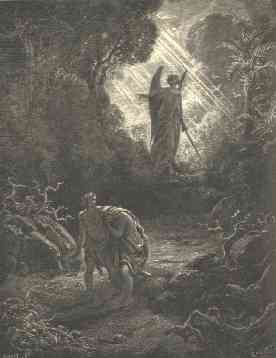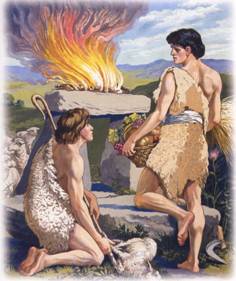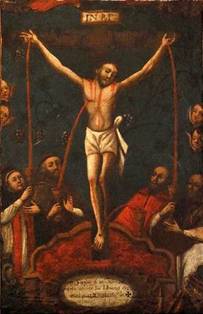O give thanks unto the Lord for He is good, His mercy endures forever (1 Chr 16:34). Beautiful Savior Lutheran Church - Winnipeg, MB
What they never taught me in Sunday School: Leaving Eden
"What they never taught me in Sunday School: Leaving Eden"
Genesis 4:1-16
October 24, 2010
Fellow baptized saints, this morning holds an interesting treat for you. We have the opportunity to explore one of the classic Bible accounts. You know, the ones we learned back in Sunday School. But this will not be a test to see what you know - In other words, no previous knowledge is required. As the sermon title suggests, this will be what they never taught me in Sunday School." Instead, we will look beyond the basics of Sunday School, and try to get a better idea of who these people really were and what they would have experienced. We will delve into the deeper meaning of this story, and ask why, out of all of history, did God choose this particular story to teach us about our relationship with Him.
When our text begins, Adam and Eve have just been kicked out of the Garden of Eden. They have just lost paradise. They have been banned from the tree of life. And they now experience pain, suffering and ultimately death. With all these new burdens, this would have been extremely traumatic for them. A far greater change of lifestyle than anything we witness even in our divided modern day. But their punishment also comes with a promise. The promise spoken against the devil. That from the offspring of Eve would come the Messiah who would end Satan's rule, restore paradise and open the way to the tree of life. Though Adam and Eve made a devastating mistake, God forgave them, and promised them redemption through childbirth.

Now, you and I yearn and thirst for the day when creation will be restored, and yet we have never experienced such a world, but Adam and Eve had. So you can imagine the incredible desire that they had to return to the perfection of paradise. I tell ya, they began that childbirth process quicker than you can say 'tree of life'. They thought their redemption was at hand. They thought they would have a child and presto, the Messiah would re-establish order and get them out of the mess they had made. So they had their firstborn, and they named him Cain.
Now, the name Cain means 'hope'. Cain was his parents' hope for redemption. But his younger brother was given the name Abel, which means ' vanity.' To Adam and Eve, Abel, and every child after him would only ever be vanities in comparison to Cain. As Cain and Abel grew up, they were taught about the promise of the Seed, and perhaps Cain was even treated like he was the key to this hope. He was taught to be a farmer like his father, while Abel was given the humble task of shepherd. Cain was the older lord, and Abel was the younger servant. Everything was expected of Cain, and nothing was expected of Abel. And then it came time to thank God. It was time to offer a sacrifice.
Now, there is one key matter about this sacrifice that must be made clear. God is not making a comparison between the two brothers, like Adam and Eve did, and as we tend to do. He is not hosting a game show in which there is a winner and a loser. Everyone can be approved at the same time, much like today during the Divine Service when we return our offerings to the Lord. It is not a competition. Similarly, God is not concerned with the type of offering being sacrificed, as though He is some big, carnivorous, blood-thirsty God. Instead, God looks at the heart. In Abel He sees faith, faith that trusts He is merciful and good, and because of this God approves his sacrifice. It is the person who is righteous by faith, not what they do, or what they bring. When someone grasps the grace that is offered in Christ and His promise, only then does God see what they do as good. But never before. Without faith, all good deeds are like filthy rags in the eyes of God. This is the case with Cain.

Though outwardly righteous and good, in Cain God sees only a prideful sense of entitlement and the prestige of being firstborn. Cain hoped he would be first with God because he is first with his parents. In the sinful nature we all inherit, he hoped in himself and thought nothing of the promise. Consequently, God does not approve of his sacrifice. God hates this pride and cannot bear Cain's contempt of His grace. As a result, Cain's hope in His 'firstness' is crushed. He is publicly disgraced and his stiff pride is violently insulted. His face fallen, he could not be around his family. He could not look his parents in the eye. He would growl instead of speak. He walked around restlessly, gnashing his teeth.
It is here that our Lord tries to comfort and warn poor Cain. He says to him, "Why are you so angry? If you believe in the promise, you have a gracious God and there will be forgiveness. But because I see that you have no faith, you are not free from your sin, but your sin remains." God warns Cain, just as He warns you and I. Your impulse is to sin, but you must rule over it with faith, or it will destroy you. Sin is quiet while we commit it and we believe that our sin will remain secret. But if we do not believe the promise, that quiet little sin will be roused into a deafening roar.

As we know, Cain does not care about his sin. He has made up his mind. Instead, like a mischievous leprechaun, Cain acts under the disguise of kindness, and tricks his entire family into thinking he had repented. He lures his brother in - until there is an opportunity to kill him. You see, it is not enough for Cain to be the lord of the house. He wants to be the son of God and make judgment over all things too. And so he murders his own brother.
Of course, we're all thinking. How terrible. How evil. As humans, we elevate the sin of committing murder up on a pedestal, as though it is a worse sin than the others. And yet it is a sin of which we are all guilty. Here comes your sinful pride's natural reaction. 'How dare you? I'm not a murderer, I've never even thought of taking someone's life, and I know I would never be that violent.' But what does Jesus say? Jesus says, "You have heard it said 'You shall not murder; and whoever murders will be liable to judgment.' But I say to you that everyone who is angry with his brother will be liable to judgment." Jesus equates being angry and committing murder. (pause)
Not fair? Don't make Cain's mistake and set yourself up as the judge. Christ reveals this truth to us, so that you and I may confess our sin, not avoid it. In the eyes of God, being angry with someone is as evil and violent as murdering them. Certainly there are different consequences here on Earth, but in God's eyes and according to what He says, and what He sees in your heart - they are identical.

But which of us doesn't get angry? We've all had anger in our hearts since birth. It becomes plain when we hit the terrible two's. But what's worse, is that just like Cain, we are most often angry at those who are closest to us. Our brother or sister, spouse or parents. You may even be angry that I have preached God's Word in its purity. I agree, it is difficult to hear, but you can't let yourself off the hook for this one. Your anger is entirely your fault. Yet somehow this should not surprise you. This is the reason God had Moses record this story. You and I are guilty of committing murder along with Moses, King David, St. Paul and every other human that has ever lived. In the eyes of God, we are guilty of committing murder.
But, there is good news for you. Your God, that promised Messiah, Jesus Christ came to Earth in order that He might forgive murderers. He wants to let you off the hook. Now that He has been crucified, He chooses to freely forgive the wrongs of all those who put their faith in Him. It doesn't matter how angry or violent you have been, confess it to Christ. He has set you free. There is nothing so terrible that He will not forgive you. (pause)
Remember at Jesus' trial, a murderer was released in His place. Through faith, that murderer is you. You are released in Jesus' place. On that day, Jesus took your punishment for you. You are free. He forgives you for being angry and for every other sin that you have committed. He paid for all sin by taking it into Himself. By swallowing it up in Himself. - By His wounds we are healed - And by His death, we have life. He did this out of His immeasurable love for you, despite everything you have done. He still loves you.
Going back to our brothers, God offers Cain that same forgiveness and love. He promises to protect him by putting a special mark on him. God has shown Cain undeserved grace, but Cain still has contempt for God's grace and is unwilling to confess his sin. Instead, he flees from the presence of the Lord in despair. Cain is unwilling to do what a Christian does, that is, honestly confess his sins to God, who already knows them, and receive His unlimited forgiveness. This is what we do at the very beginning of the Divine Service. We remember our baptism, the same special mark of protection that God has given us. In it, we confess our sins, and God forgives us. Sometimes it is difficult to do, but as Christians we are free to come to our Father's throne of grace.

Ultimately, this is the only difference between Cain and us. We have not fled the presence of God, but instead we seek His forgiveness here in His house, and here at His table. Here we seek His real presence - when you commune, you drink the very same blood that Christ shed on the cross to pay for your sin. On that gruesome day, as the blood dripped from His tortured body, it drips through time into your mouth at this altar and holds you fast in His presence. In the real presence of His body and blood, God has the power to teach you how to control your anger, and how to forgive those who wrong you. Together our hearts shout. Praise the Lord! Let my soul sing to Him, the giver of all that is good. For He has done marvelous things for me.
Well, I suppose in Sunday School you were never taught that you are guilty of committing murder. But you were taught that Jesus died to save everyone. And He would do it again in a heartbeat if He had to. He would do it as many times as it takes to save you. The one He loves. May you always be drawn to the real presence of the Lord who bought you with His love. In Jesus' name, Amen.
Rev. Cameron Schnarr



